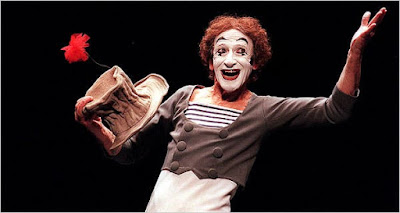AUGUST 7/8, 2021
Marcel Marceau was a French actor and mime, most famous for his stage persona “Bip the Clown.” He was born into a Jewish family in 1923, and owing to the Second World War, spent a good portion of his youth in hiding. His father was deported to the Auschwitz concentration camp, and died there. Marceau and his brother Alain joined the French Resistance, and worked to save innumerable children from capture and deportation.
His mime routines, included The Cage, Walking Against the Wind, The Mask Maker, and In The Park. All of these are considered today to be classic routines.
When he was 5 years old, his mother took him to a Charlie Chaplin film, which captivated his imagination, and attracted him to mime and acting.
He called mime, The Art of Silence, explaining in a 1987 interview:
The art of silence speaks to the soul, like music, making comedy and tragedy, involving you and your life. . . . creating character and space, by making a whole show on stage - showing our lives, our dreams, our expectations.
He received world renown and held many high international honors in the arts. He died in 2007 at the age of 84.
Today is the 19th Sunday in Ordinary Time.
In St. Paul’s Letter to the Ephesians, he exhorts us to “be imitators of God,”
The word St. Paul uses here that is translated “imitators” is μιμητής (mimētḗs) – which is where we get the English words mime, mimic, and mimeograph ... to name a few.
We are to imitate God, however, not just by copying Him or by mimicking Him, but rather – as St. Paul says – “as beloved children, [to] live in love, as Christ loved us and handed himself over for us as a sacrificial offering to God for a fragrant aroma.”
And so the starting point, is love. And not a gushy modern melodramatic love, but rather a tough love ... a difficult love ... a sacrificial love.
In the Gospel, we continue with John chapter 6, and Jesus continues to expound on what we heard last week, where He told His listeners that He, Himself, is the Bread of Life.
This sets the people off, as they start to run through what they understood of Jesus’ background. They knew Him ... or at least they thought they knew Him.
Yet Jesus repeats Himself, restating, “I am the Bread of Life”, telling them that “whoever believes has eternal life” and whoever “eat[s] it [will] not die.”
And finally today’s passage from the Gospel ends with Jesus saying one more time:
I am the living bread that came down from heaven; whoever eats this bread will live forever; and the bread that I will give is my flesh for the life of the world.
In the Eucharist, we receive the Body of Christ. Our “Amen” is a profession of our faith in that reality – a reality that transcends the material world.
Three characteristics of the host we receive – visible to all – give us an insight into how we are to imitate God.
The host is small. Reflecting the humility of God – not only in becoming a human being in the Person of Jesus Christ, being born in a stable, and living a relatively obscure life in a small back-water of the Roman Empire ... but also in that He still comes to us under the form of bread and wine. Because His coming is so humble, we can miss it if we are not attentive to the mystery ... the miracle before us. We are called, as well, to humble ourselves ... so that we might not miss God’s presence in our midst.
The host is round. Reflecting the eternity of God. We are called to believe in Jesus Christ, and are to call him Savior, Brother, Son of God. A living faith is our ticket to eternal life ... and so, we too are called to live with Christ in the Kingdom of God ... in eternity.
The host is white. Reflecting the purity of God. At the end of Revelation chapter 21, we are told that “nothing unclean will enter [heaven].” And so, we are called to live our lives in purity and holiness.
As we approach this altar to receive the Sacred Body and Blood, Soul and Divinity of Jesus Christ, let us pray for the grace we need to truly imitate God in all that we say and all that we do. And as we receive the Eucharist from this altar today, let us heed the words of the angel to Elijah: “eat, [or] else the journey will be too long.” And as we eat, may we remember that we are called to embrace humility, purity, and eternity – imitating God in all things, but especially in His Love.






